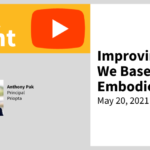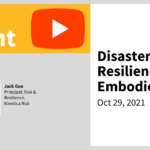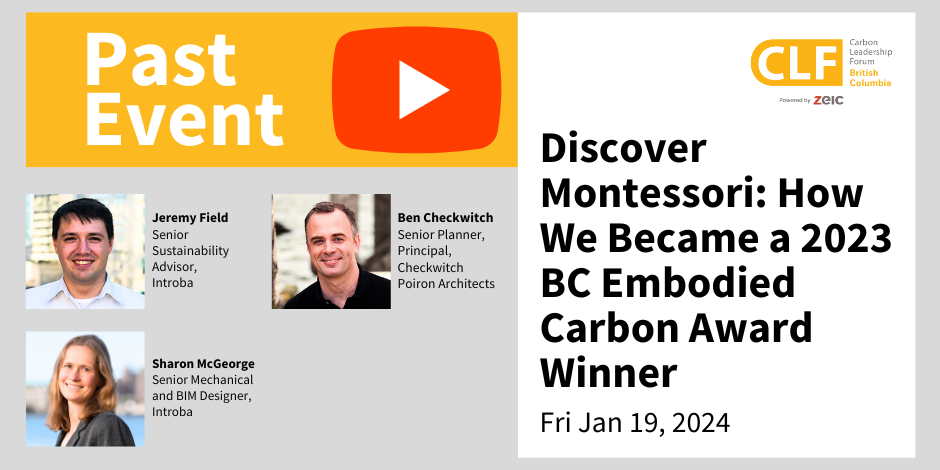
Improving How We Baseline Embodied Carbon
May 20, 2021
Disaster Resiliency & Embodied Carbon
October 29, 2021
PAST EVENT: Circular design is a hot topic right now, but what is it exactly, and what role does it play in embodied carbon?
Circular design is based on the principles of designing out waste and pollution, keeping products and materials in use and regenerating natural systems.
Join us on Thursday, September 9th from 12-1:30pm PST to learn about circular design and how it helps reduce embodied carbon. Our speakers will discuss climate solutions in the built environment, the adaptive reuse of buildings and adapting the circular economy to the built environment.
Hannah Teicher:
Benjamin Sanchez:
David Ness:
Q&A:
Speakers:
Hannah Teicher, Researcher-in-Residence, Pacific Institute for Climate Solutions (PICS)
Dr. Hannah Teicher is PICS’ Researcher-in-Residence, focusing on climate solutions in the built environment. She brings experience in research and practice at multiple scales from the building envelope to regional coalitions. She has a PhD in urban and regional planning at MIT where she focused on cross-sectoral collaborations for adaptation. In her research, she analyzed how a climate security agenda is being mobilized across multiple levels of government in the U.S. to develop community/military collaborations for resilience to sea level rise. To support this research, she was awarded the highly competitive MIT Martin Fellowship for Sustainability.
Before beginning her research career, she practiced architecture with Shape in Vancouver where she helped design cutting edge, green residential and community projects. She also taught ecological design at Emily Carr University of Art and Design and contributed to strategies for EV infrastructure with the Transportation Infrastructure and Public Space Lab at the University of British Columbia. She holds a Master of Architecture from UBC and a B.A. in sociology and anthropology from Swarthmore College. She has written extensively for peer-reviewed and industry publications regarding sustainable design and planning.
Benjamin Sanchez, Associate Professor, Tecnológico de Monterrey
Dr. Benjamin Sanchez is a Professor of Civil and Environmental Engineering at the Tecnológico de Monterrey campus Puebla and a Young Energy Professional (YEP) ascribed to the Energy Council of Canada. His research is focused in the development and implementation of emergent technologies (BIM, CIM, IoT, Big Data, Machine learning, LCA, 3D scan to BIM) for increasing the performance of construction building projects in terms of sustainability and Circular Economy. Benjamin has done recent contributions on international journals for the valuation and monetization of the environmental impacts of the residual life of building stock in North America. His contributions add a Life Cycle Assessment (LCA) perspective to the decision-making methodology involved in adaptive reuse of buildings, in order to contribute to sustainability and climate change through mitigation of CO2 emissions.
Benjamin is a Civil Engineer with a doctorate in Civil Engineering from the University of Waterloo. Benjamin has been active in the promotion and dissemination of his research work in important forums, through participating in international research academic experiences at Chalmers University in Sweden and ETH Zürich in Switzerland. Also, he has presented his original work in international conferences (ISARC, CIB WBC, CSCE, ASCE, NHICE), and he has collaborated in projects with international organizations such as the Energy Council of Canada (ECC), the Federation of Canadian Municipalities (FCM), and the United Nations Climate Change Conference COP23.
David Ness, Adjunct Professor, UniSA STEM
Dr. David Ness is Adjunct Professor, UniSA STEM, University of South Australia, with a background in architecture, urban and infrastructure planning, and strategic asset management. He conducts research on fair, sufficient, and circular resource use, and was awarded the Arup 2017 Global Research Challenge to adapt the circular economy to the built environment. David has also developed conceptual models on ‘doing more with less’, delivering more services with less resource consumption and less cost, involving integrated infrastructure systems and new business models such as product-service systems.
He heads ‘Ecological Development Union International’, a not-for-profit international association that seeks to integrate environmental improvements with socio-economic development in emerging economies of Asia/SE Asia. Within the context of the SDGs, the Paris accord on climate change, and achieving global equity, David examines ways in which wealthier societies may dramatically ‘shrink’ their absolute resource consumption and Greenhouse Gas emissions, while redistributing resources and investment to enable the disadvantaged to improve services, shelter, and infrastructure – thereby striving for global and regional rebalancing and equity.
He has advised UN ESCAP and UN Habitat on ‘green growth’ and sustainable, integrated, and inclusive infrastructure, led a training course at the International Urban Training Centre, and evaluated a major UN clean environment program involving 60 cities across the Asia Pacific. David was lead researcher on the project ‘Learning from Regional Climate Analogues’ for National Climate Change Adaptation Research Facility (NCCARF), and has been a Chief Investigator (CI) on ARC research projects. He has authored over 100 publications, including ‘The Impact of Overbuilding on People and the Planet’ (2019), ‘Transforming Rural Communities in China and Beyond’ (2015), and co-edited ‘The Green Economy and its Implementation in China’ (2011).





